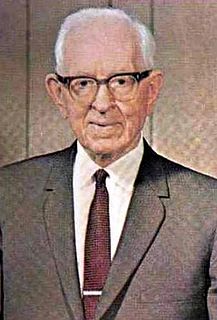A Quote by Pete Buttigieg
My understanding of my faith is that - through a Christian framework - part of what we are called to do is to lay down our own self-interests, after the model of divinity that comes into this world in the form of Christ and lays down his life. And in order to do that, you have to care about something or someone more than yourself.
Related Quotes
There is something new in the air. There is, there is a - a hunger for an open, non-dogmatic, form of Christian faith and practice, which adapts itself to a rapidly changing world; and speaks to that world the message of Jesus Christ. And a freedom to rediscover some of the language of the tradition now that's it's not handed down to us, you know, with a strict framework of doctrinal, fixed structures.
There is no greater love than that a man lays down his life for his neighbor. When you hear someone complaining and you struggle with yourself and do not answer him back with complaints; when you are hurt and bear it patiently, not looking for revenge; then you are laying down your life for your neighbor.
Christian faith is exclusivistic. Christian faith lays claim upon our lives. The sanctity of life, what we do with a life, is very definitive in the Christian faith, what we do with sexuality, what we do with marriage, all of the fundamental questions of life have points of reference for answers, and people just have an aversion for that. That I think is the biggest reason they feel hostile towards the Christian faith.
'Greater love has no man than this that a man lay down his life for his friends' (Jn. 15:13). In truth if someone hears an evil saying, that is, one which harms him, and in his turn, he wants to repeat it, he must fight in order not to say it. Or if someone is taken advantage of and he bears it, without retaliation at all, then he is giving his life for his neighbor.
The earthly form of Christ is the form that died on the cross. The image of God is the image of Christ crucified. It is to this image that the life of the disciples must be conformed; in other words, they must be conformed to his death (Phil 3.10, Rom 6.4) The Christian life is a life of crucifixion (Gal 2.19) In baptism the form of Christ's death is impressed upon his own. They are dead to the flesh and to sin, they are dead to the world, and the world is dead to them (Gal 6.14). Anybody living in the strength of Christ's baptism lives in the strength of Christ's death.
More than we care about their "success," vocation, or financial status, our hearts will be encouraged when our kids are faithful followers of Christ, and our hearts will be distressed when our kids appear to reject the Christian faith. So, the most important thing is transferring our kids' allegiance from us to Christ, raising faithful disciples who seek first the kingdom of God and his righteousness.
You have to lay down in the center of the action lay down and wait until it charges then you must get up face it get it before it gets you the whole process is more shy than vulnerable so lay down and wait sometimes it's ten minutes sometimes it's years sometimes it never arrives but you can't rush it push it there's no way to cheat or get a jump on it you have to lay down lay down and wait like an animal .
problematic within post-Reformation dogmatics. Is faith something I `do' to earn God's favour, and, if not, what role does it play? Once we release Paul's justification-language from the burden of having to describe `how someone becomes a Christian', however, this is simply no longer a problem. There is no danger of imagining that Christian faith is after all a surrogate `work', let alone a substitute form of moral righteousness. Faith is the badge of covenant membership, not something someone `performs' as a kind of initiation test.
One can understand nothing of Christ without the mystery of the Trinity, nothing of the Church without faith in the divinity and humanity of Christ, nothing of the sacraments without the bridal mystery between Christian life without Christian faith. Thus, the present sermons revolve around the same center--the inexhaustible mystery of the one indivisible faith.
...it is proper that the duty of helping the poor and unfortunate should especially stir Catholics, since they are members of the Mystical Body of Christ. In this we have come to know the love of God, said John the Apostle, that He laid down His life for us, and we likewise ought to lay down our life for the brethren. He who has the goods of this world and sees his brother in need and closes his heart to him, how does the love of God abide in him? (1Jn 3:16 17)
My father's life was changed right before my eyes [when he trusted Christ]. It was like someone reached down and switched on a light inside him. He touched alcohol only once after that. He got the drink only as far as his lips and that was it-after forty years of drinking! He didn't need it any more. Fourteen months later, he died form complications of his alcoholism. But in that fourteen-month period over a hundred people in the area around my tiny hometown committed their lives to Jesus Christ because of the change they saw in the town drunk, my dad.
A job is a vocation only if someone else calls you to do it for them rather than for yourself. And so our work can be a calling only if it is reimagined as a mission of service to something beyond merely our own interests. Thinking of work mainly as a means of self-fulfillment and self-realization slowly crushes a person.

































